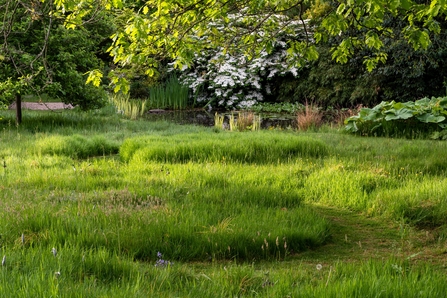
Long, grassy lawn. Image by Julian Weigall @ RHS.

Long, grassy lawn. Image by Julian Weigall @ RHS.
The charities are encouraging gardeners to experiment with a new look lawn in 2023 for the benefit of wildlife and also the wider environment. They are inviting people to raise the blade on their mower and cut their grass less regularly, embrace daisies, dandelions, clovers and other naturally flowering plants, and even grow container lawns if space is at a premium.
Lawns left to grow long are shown to help mitigate flooding by better soaking up rainwater, counter the heat island effect in urban areas through their cooling properties, and capture pollutants. They are also better at resisting browning during dry spells than short grass owing to their longer roots. This means that their benefits continue into the height of summer, and provide all-important habitat for a whole host of insects including ants, bees and butterflies.
Five ways to love your lawn this year:
Duncan Hutt, Northumberland Wildlife Trust Director of Communications says:
“Everyone can enjoy the beauty of longer lawns! Gardeners have spent too long battling against nature to maintain lifeless green carpets of closely cropped grass, so it’s time to take a step back and help nature and climate by letting lawns live wilder and grow longer.
“Avoid plastic lawns - they may be easier to maintain but they will turn your gardens into lifeless deserts and end up in landfill!”
Helen Bostock, Senior Wildlife Specialist at the RHS, says:
“Lawns, while central to many garden designs, are often overlooked as important ecosystems in favour of the plants in beds that border them. But they’re home to a huge amount of wildlife and help mitigate the impact of climate change. We want to inspire people to get up close and personal with their lawns this year, discover what can be found in their swathes of green and dabble with new, more hands-off means of management.”
For more information on the benefits of lawns in gardens download a copy of the Bring your lawn to life guide. The public can find it on the Wild About Gardens website wildaboutgardens.org.uk from Wednesday 22nd March.